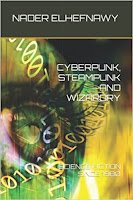In its premise
The Aquitaine Progression is consistent with the familiar Ludlum formula. (An American East Coast bourgeois in Europe finds himself caught up in an international conspiracy, and on the run from both the bad guys and the authorities as he tries to stop the villains.) Likewise many of the factors plugged into the formula likewise familiar. (The collision of war veteran and antiwar protestor, mad American generals who were spendthrift with their soldiers’ lives in an Asian land war and mad French generals who had opposed De Gaulle, the ghosts of World War Two and Algeria and Vietnam, the use of terrorist outrages to pave the way for an international fascist takeover. Even old Carlos gets a few mentions, as do the Sonnenkinder, the latter proving the more significant.) Indeed, some of the borrowings seem particularly specific. (Joel Converse’s history so much recalls that of Quinn O’Brien from
The Chancellor Manuscript that it can seem as if Ludlum decided to take what was a supporting character in that earlier book and build a novel around him--the way that Ludlum arguably did with Stefan Varak from the same book when creating
The Parsifal Mosaic’s Michael Havelock.)
However, this time around Ludlum is clearly attempting to do something different with these elements. Perhaps in part because those elements are so familiar Ludlum discards the element of mystery of who the bad guys are and what they want. In contrast with, for example, the mere hints Ludlum offered at the outset of
The Holcroft Covenant, the identity of the villains, and their intentions, are entirely clear from the start in this book, to the protagonist as well as to the reader. (In fact, rather more mystery surrounds the identity of those sponsoring the hero's fight against them.) The result is that the hero’s task is, even more than before, not unmasking the villains but simply stopping them. And perhaps because the hero is the familiar Ludlum type in important ways, Ludlum modifies the figure significantly--while investing more heavily than usual in character development. Unlike the protagonists of his prior three novels--Brandon Scofield, Jason Bourne, Michael Havelock--Joel Converse is no professional super-agent. (Where Quinn took his law degree to the FBI Converse is just the lawyer operating in the world of international business he appears to be.) However, unlike many of Ludlum's earlier, non-secret agent heroes he has a deep familiarity with violence. Converse was a naval aviator in the Vietnam War who, after being shot down, was captured and, escaping from a prisoner of war camp, learned to elude pursuit, learned to stalk enemies and kill in cold blood, right in the jungle--and then back in civilian life tried (never entirely successfully) to put all that behind him. The nightmare experience, it might be added, also made his enmity toward the villains in this book and their intentions deeply personal. (It was their chief who was ultimately responsible for what proved to be Converse’s fateful mission, just part of a pattern of psychopathic madness on the part of General "Mad" Marcus Delevane in what seems to me, of all the ‘80s-era Ludlum novels, the one that comes closest to the post-Watergate, post-Vietnam outrage that fueled ‘70s-era thrillers like
Trevayne and
The Chancellor Manuscript.) Also unlike many of the later Ludlum heroes Converse is neither single nor a widower, but a divorcee whose prior marriage (of course, unhelped by all the wartime baggage) is much more than a minor biographical detail.
Joel’s experience of the war, and the broken marriage, are important personal history for the purposes of the protagonist's development, and critical, too, to the unfolding of the plot--as well as what makes Ludlum’s taking one more "go" at this type of tale of more than the usual interest. Apart from providing a more than usually realized, and motivated, hero, it matters when Ludlum this time around (initially, at least) eschews the action movie heroics. Joel's principal weapon against the enemy is not a gun but the law--the search for entirely legal means with which to disrupt the machinations of the villains (why else turn to an accomplished international lawyer rather than one of the spy/commando types?)--while when violence does come into the picture Ludlum handles it as the clumsy and ugly acts of confused, panicked, often damaged men, with consequences not easily left behind, legally or psychologically, the more in as when Joel reaches out to people he knows for help in his battle and is dismissed with psychobabble about having "mentally regressed" to the traumas of his past. To Ludlum's credit it all rings true, and gives what could easily have been standard thriller stuff more than the usual frisson and force and bite.
Seeing it all I actually wondered if we were not going to see a return to the intensity and edge of the Ludlum of the ‘70s. Alas, after the midpoint of the book all this becomes less evident, the story becoming more conventional, a straightforward, thriller mechanics-oriented man-on-the-run tale without the hope of big revelations up ahead, while Joel comes to act the part of the hyper-efficient secret agent, capably dispatching enemy after enemy. The individual bits are rendered competently enough, while Joel's flight derives some compensating interest from its parallels with his wartime experience. Still, it is in the end standard chase stuff, with the middle third or so of the book having the hero getting cornered and having to trick and fight his way out and then running until he gets into another corner more times than would have served the book best, with scene changes that might have provided relief absent for very long stretches, even as the overall story comes to sprawl excessively. There come to be simply too many minor characters introduced late in the narrative to pose some minor threat or play some minor role in advancing the struggle against the villains before getting knocked off. Then when the hero, who is "back in from the cold" well before the story’s end, turns from flight to counteroffensive against his enemies, too much hinges on those supporting characters’ ability to conjure armies of helpers with the required esoteric skills at everything from computing to the application of plastique, the last reflecting just how far that return to the conventional goes. Putting it bluntly,
after all that time Joel spent assembling his legal brief that was his actual mission, which he pursued down to the end, his finally stopping the villains still comes down to a thrown-together commando raid that seems generic and anticlimactic after all that came before. Meanwhile the villains’ schemes, while not completely prevented from causing havoc, come off as whimper rather than bang, the more in as the rot the book described as leading up to it was (limited) rot
within the Establishment rather than the rot
of the Establishment the way it was in those
fiercer ‘70s-era novels.
The end result is that the book does not quite realize the promise of its first half, while being an object lesson in the problem of trying to stretch the lean old spy thrillers into quarter-of-a-million-word monsters like these. Still, at its best I found
The Aquitaine Progression more engaging than any of his other post-’70s books, and certainly a far stronger performance than Ludlum’s third and final crack at the "Fourth Reich Rising" scenario a decade later in 1995’s
The Apocalypse Watch.





